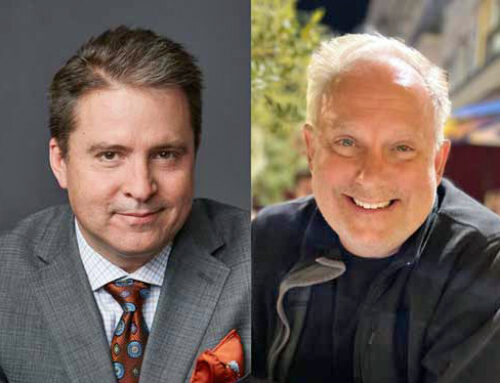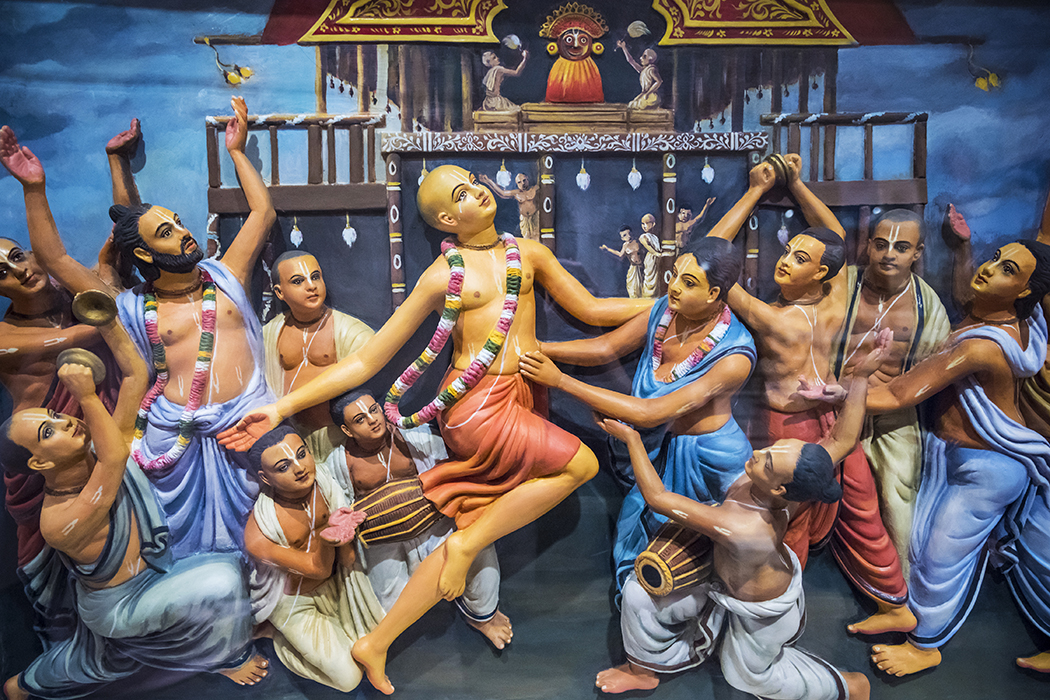
Photo by Danny Fulgencio
Amazing Faith
Dallas is often called the buckle of the Bible Belt. While about 78 percent of Dallas churchgoers claim Christianity according to the Pew Research Center for Religion and Public Life, our neighborhood is a rich tapestry of faith from traditions all over the world. Over the past several weeks, we visited houses of worship in East Dallas and witnessed everything from fasting and flower fights to mochas and a mosque. Celebrate the color, passion and belief all around us.
Radha Kalachandji Temple
Congregants hurl thousands of rose petals through the air inside Radha Kalachandji Temple in East Dallas, a fragrant shower of faith. It’s the Hare Krishna Festival of Flowers, and the Krishna idol sitting at the front of the temple is an Indian import older than the state of Texas. After honoring the deity with flower petals from more than 50,000 roses, attendees throw petals on each other, dancing and singing along. Colorful saris, traditional “dhoti” (pants) and “kurta” (shirts) make the room a dizzying scene.
Hundreds of participants take part in the ceremony, a version of the Hare Krishna practice called “Kirtan,” which means “to glorify.” Professional musicians and teachers come from India, Kazakhstan and Australia for the annual celebration, where believers recite the names of god with different melodies, rhythms and instruments.
Kalachandji’s festival runs through New Year’s Eve and lasts four days. Prayers, meditation, classes, concerts and meals fill 70 consecutive hours of celebration. “This age is characterized by short attention spans, shorter memory and a shorter temper so a very simple form of meditation is given,” says Nityananda Chandra Granger, a minister at Kalachandji’s.
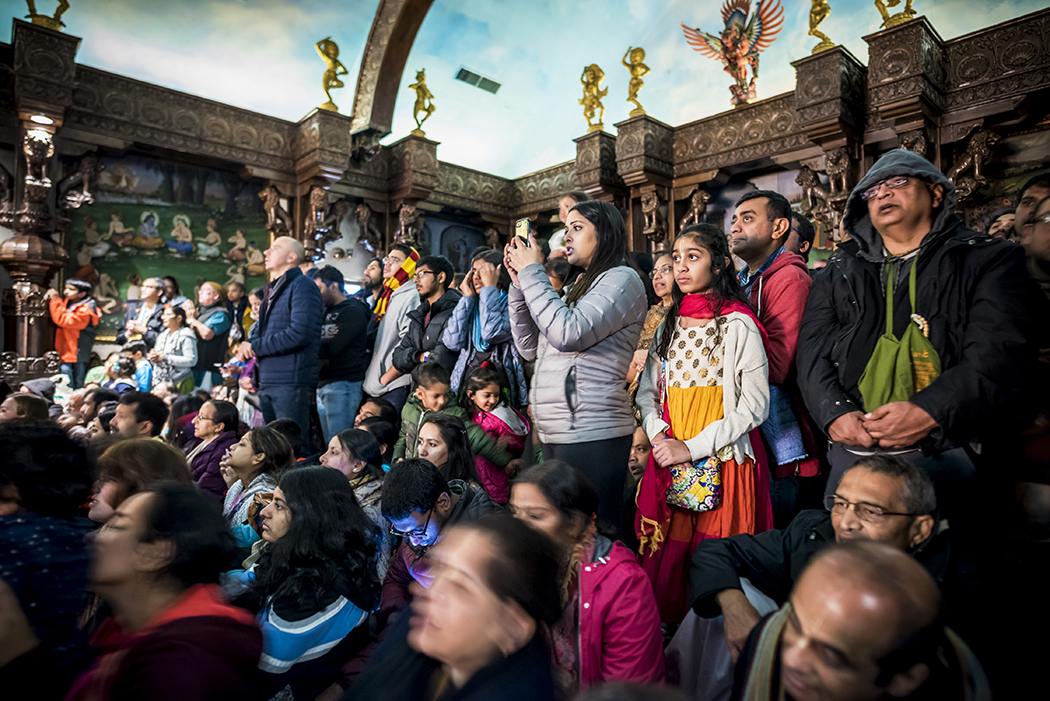
Photo by Danny Fulgencio
Granger grew up as a Christian in Hawaii, but found his way to his faith after studying at a Hare Krishna temple in Portland. “I was never attracted to the idea of a mean guy who favors people of a particular group for never-ending torture,” he says. Granger belonged to the vegetarian punk movement in Portland before he joined the temple. “I went from punk to monk,” he says.
Most neighbors know about Kalachandji’s restaurant, which serves colorful vegetarian Indian food cafeteria-style, but Hare Krishna believers from all over Texas practice their faith at the adjacent temple since the nearest Hare Krishna temple is in Houston.
Tamal Krishna Goswami, an SMU doctorate student, founded the temple in 1971. The congregation settled on the campus at Graham and Gurley in Mount Auburn in a facility that once housed a church. The temple room used to be the church’s basketball gym.
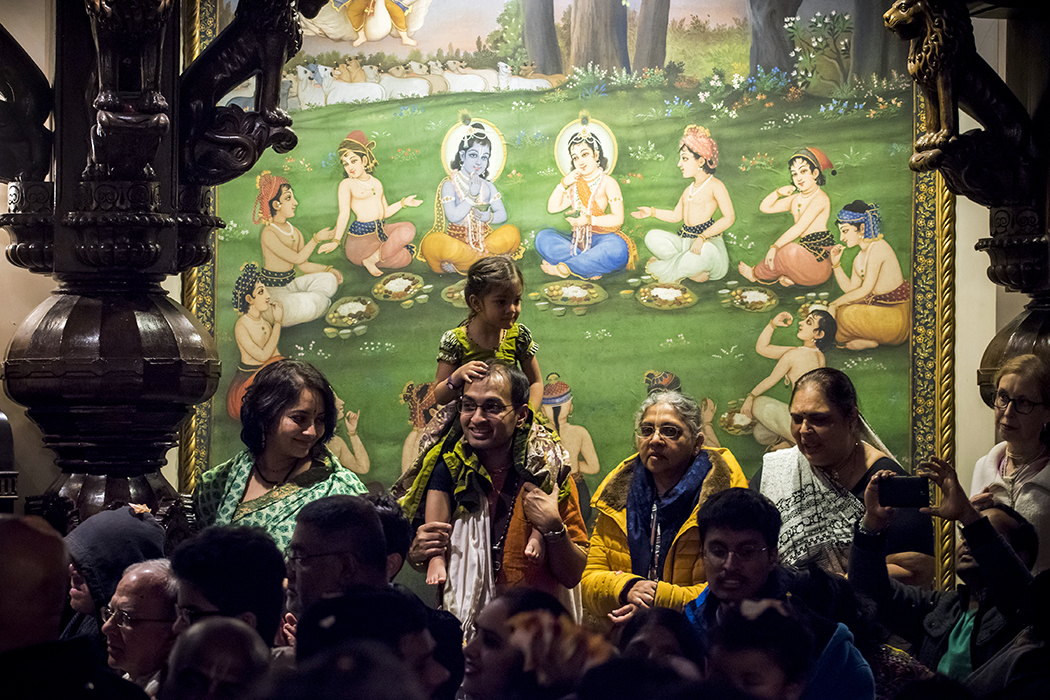
Hundreds of believers come from all over the country to take part in the Festival of Flowers. (Photo by Danny Fulgencio)
More than 50 Hare Krishna families moved into the neighborhood to be close to the temple, and many children attend TKG Academy, a religious elementary and middle school down the street from the temple.
The temple offers regular daily prayers, a Wednesday class for beginners called “The Darshan Room,” and a Sunday gathering called “Krishna Fest.” Granger describes the temple’s ceremonies as “loving interactions with God himself.”
For more information visit kalachandjis.com.
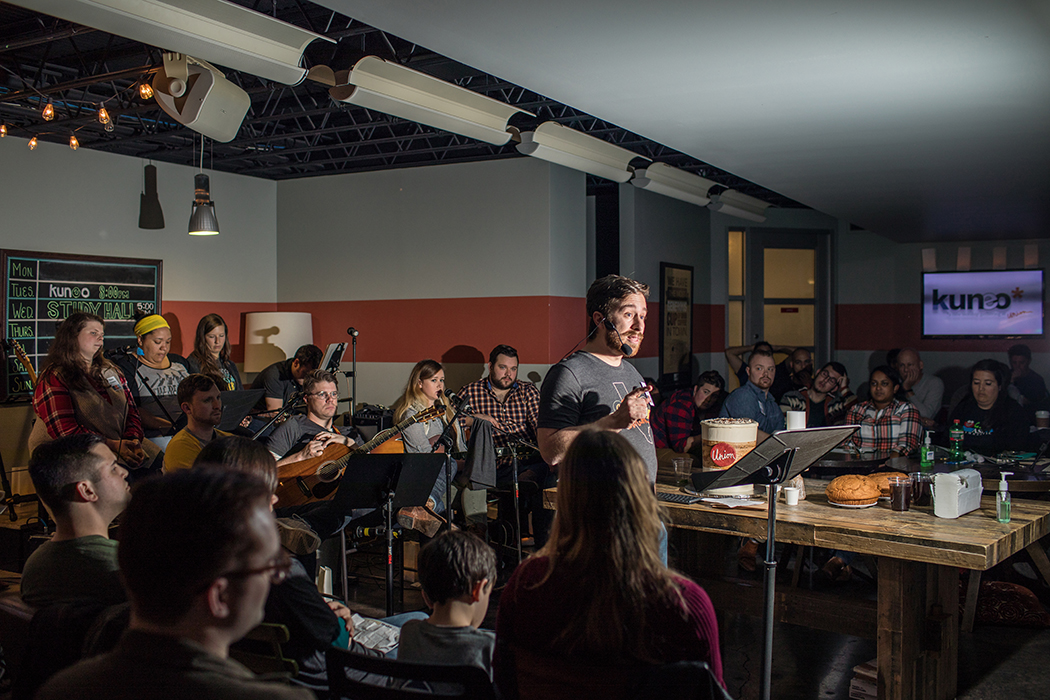
A packed sermon led by Rev. Mike Baughman at Union Coffee’s Dyer Street location. A worship community called Kuneo gathered for the last time in December before the shop’s new location at 3707 Cedar Springs Road. (Photo by Rasy Ran)
Union Coffee
The coffee shop is standing room only this Tuesday night as the Misfit Whatevers take the stage with guitars, vocalists and percussion. Music drowns out the espresso machine that is still serving customers, and lyrics are projected on the wall so that the audience can sing along. The song is “Pompeii” by Bastille, a popular indie rock song, followed by “Home” by Phillip Phillips of “American Idol” fame. An uninformed guest who walks in for mocha might think this is just a popular cover band, but a sermon from pastor Mike Baughman brings the event into focus.
Union Coffee is a ministry that hopes to transform the concept of church. “We want to cultivate the divine spark of our neighbors for the good of Dallas,” says Baughman, who is described on the group’s website as a “community curator.”
People who didn’t normally go to church helped start Union, which includes a coffee shop that supports the ministry and gives 10 percent of proceeds to local causes. Assistant pastors and members often work as baristas when they aren’t taking care of church duties.
The group hopes to minister to those who have felt alienated by traditional churches, including those on the LGBTQ spectrum. “Kuneo,” which means “to kiss,” is the name of the Tuesday night service. In some ways, it resembles a traditional church service with pastors, a sermon, communion and a call and response creed. In other ways, Kuneo is different. The songs are a mix of Christian and secular, though they often have a message that relates to the theme of the service. “Most people are church refugees,” Baughman says. “But the songs of a homeland still matter to a refugee.”
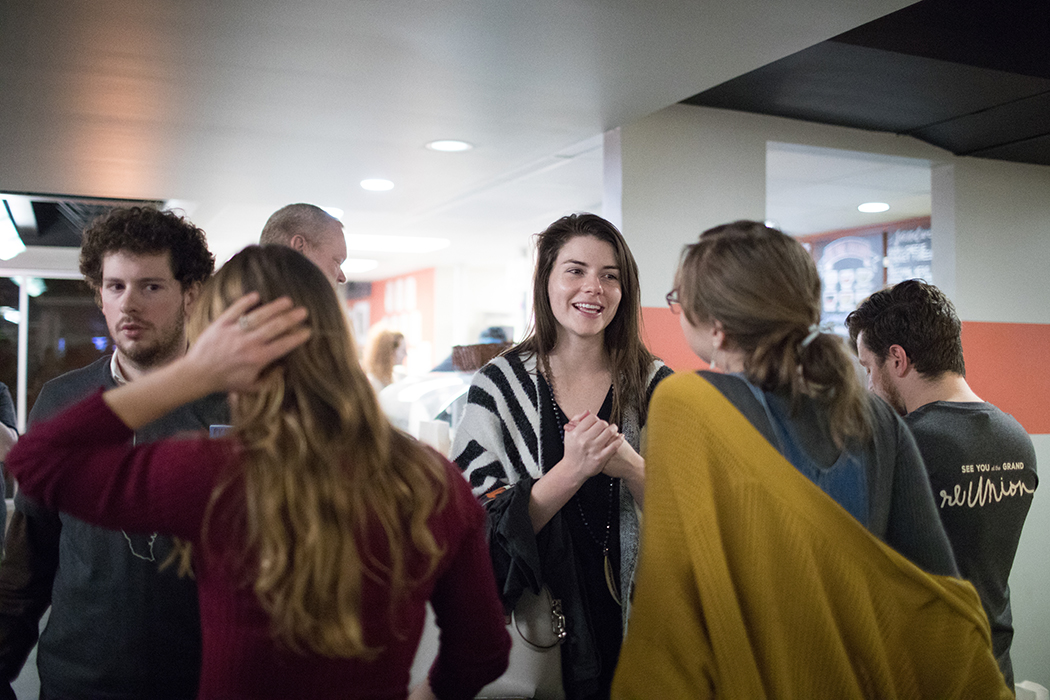
Conversations flow through the room after the last sermon has finished at Union Coffee’s former Dyer Street location. The coffee shop continues its weekly worship gatherings every Tuesday night at its new location off 3707 Cedar Springs Road. (Photo by Rasy Ran)
The sermon is a conversation. Baughman asks a question and expects a response from the young congregation. Members seem ready to finish his sentences when prompted. He calls them “sermons in the round,” and he doesn’t shy away from subjects like sex and finances. Baughman welcomes a variety of people to take the stage and preach each week.
Union emphasizes breaking boundaries and storytelling. “Naked Stage” on Friday nights is a forum for storytelling and spoken word performances. “When people start telling their story, they see they have the divine spark,” Baughman says.
At Sunday night’s “Studio” service, an artist shares his or her work then Baughman introduces a topic to be discussed by the congregation. The audience breaks into small groups and shares responses after a few minutes. “A studio is a place where someone creates, discovering things about themselves and their place in the world while refining their work,” reads the website.
Union is on the move from its location on Dyer street near SMU, and eventually will settle in the old Brink’s coffee shop at Gaston and Carroll.
At their final Kuneo, Baughman plays a clip from “The Lord of The Rings,” where Sam and Frodo go the farthest from home that they have ever traveled. “As Union goes on the road, things will be uncovered,” Baughman says. “It might be hard and will probably be beautiful, but God will be in it.”
For more information, visit uniondallas.org.
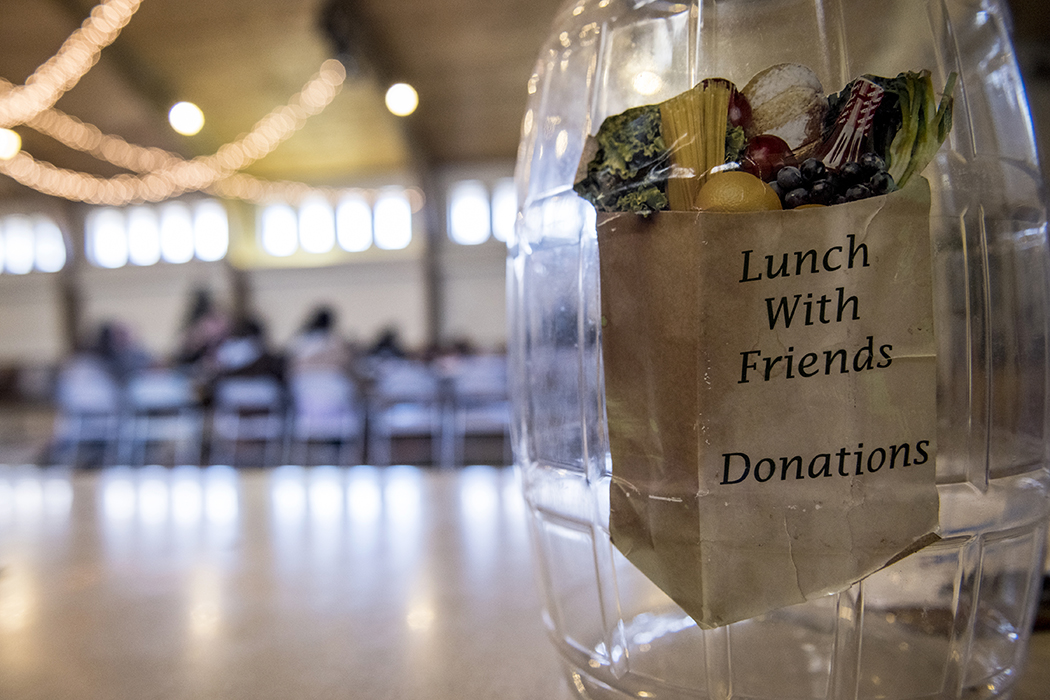
Providing services and meals to those suffering from AIDS is central to White Rock Community Church’s mission. (Photo by Danny Fulgencio)
White Rock Community Church
The congregation of the stately brick church on Garland Road always has straddled the line between traditional and progressive. It was created 26 years ago in a private home as a safe space for gay and lesbian members to connect with their faith, during a time when other churches were less accepting of their lifestyle.
“It’s an evangelical church but it was founded in the LGBT community,” says Pastor Douglas Shaffer. “As far as churches go, we’re pretty conservative, except when it comes to LGBTQ acceptance.”
It quickly established its mission to support those suffering from AIDS, providing food and supplies, hospital rides and a sense of human connection to those afflicted by the disease. To this day, the church works with around 6,500 AIDS patients, providing free meals every Saturday along with household items like toilet paper.
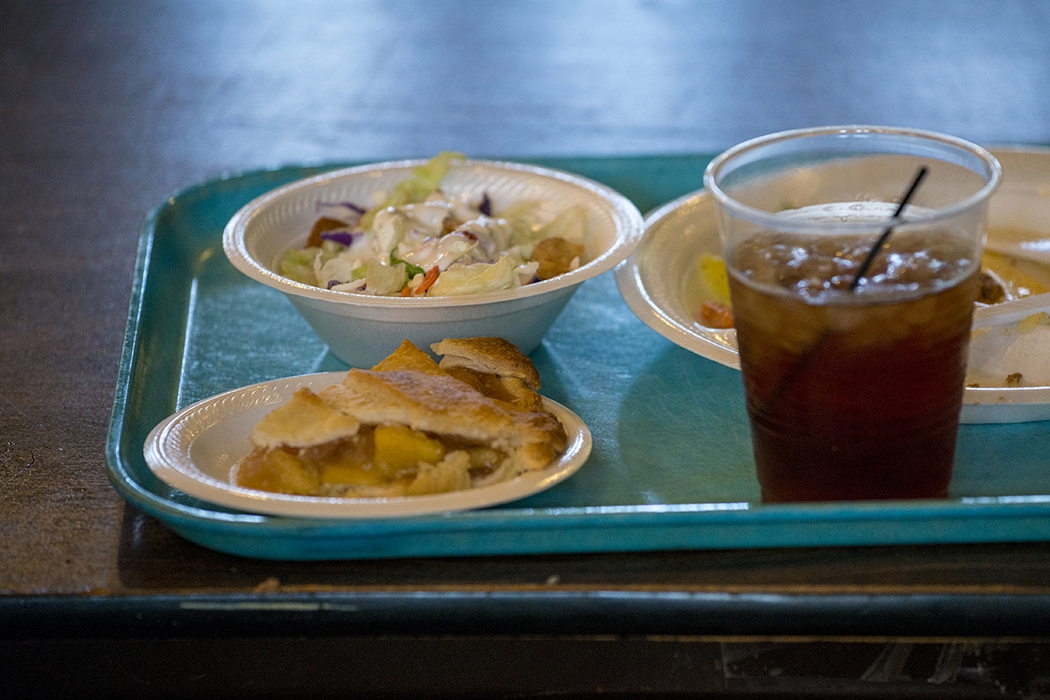
Photo by Danny Fulgencio
That program is the only thing keeping the congregation of about 125 in its Little Forest Hills location. The congregation has considered options to sell the church and chapel for more than a year, and nearly became an apartment complex until the city deemed the project was too high in density. Shaffer says the property is too large and expensive to maintain, pointing to the $200,000 spent to replace the HVAC system.
“That’s a whole lot of missions we could have done,” he says. “A congregation our size just doesn’t need 40,000 square feet of space.”
Shaffer says the congregation has been “dating” other churches, looking for a place to partner to hold worship services and feed the sick without the responsibility to maintain a property. He believes the financial freedom will allow them more resources to help others.
“We want to expand our options to do more ministries,” Shaffer says. “We’ve said at our church for years, the church is not the building, it’s the people.”
Learn more at whiterockchurch.info.
—Emily Charrier
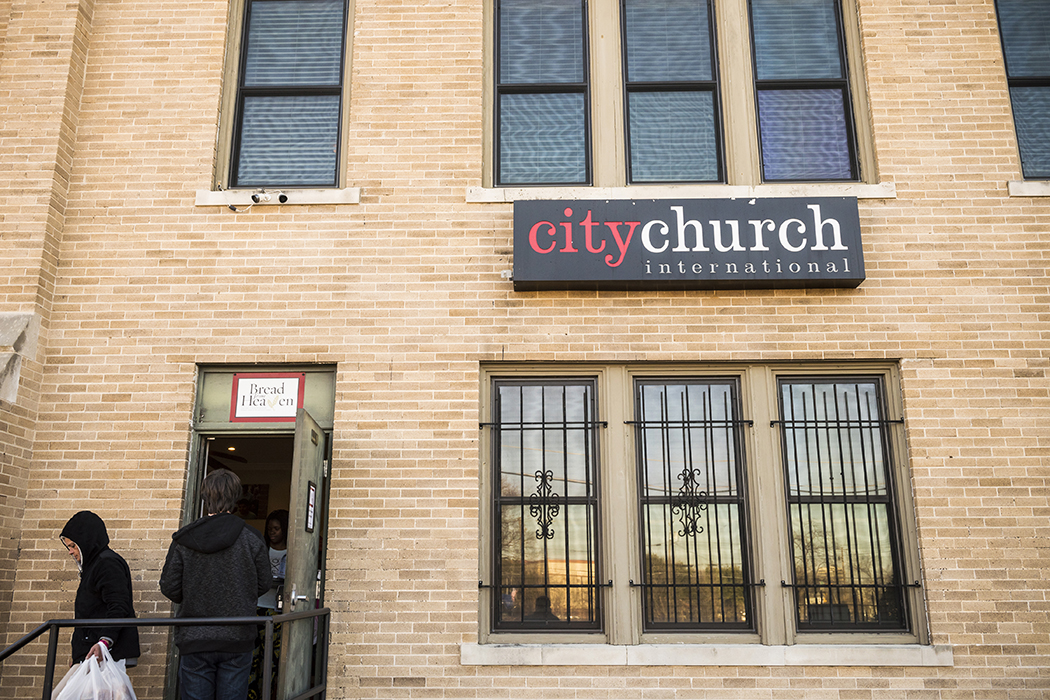
Photo by Danny Fulgencio
City Church International
A rainy night doesn’t stop the congregation from filling City Church International in Old East Dallas. This Sunday night marks the end of a period of fasting to begin 2018 for the church’s faithful. Some members avoided food altogether or skipped a meal each day, while others took a break from social media or television. The fast refocuses the believers on what is important in the New Year.
Inside the church, the worn wooden pews and steep slope toward the stage bear witness to the church’s age. In 1920, the building housed the Central Congregational Church, and the gothic revival structure is now on the National Register of Historic Places. Pastor Brad Weir takes the stage to deliver a message of trust, describing the fear he dealt with during his wife’s battle with brain cancer and the hope that followed.
Weir left his family’s eponymous furniture company 10 years ago to start the church after he began ministering to employees who worked in the warehouse. He wanted to reach across boundaries that divided the world around him such as ethnicity, education and politics. “Our heart was to see what it is going to be like in heaven one day right here on Earth,” he says.
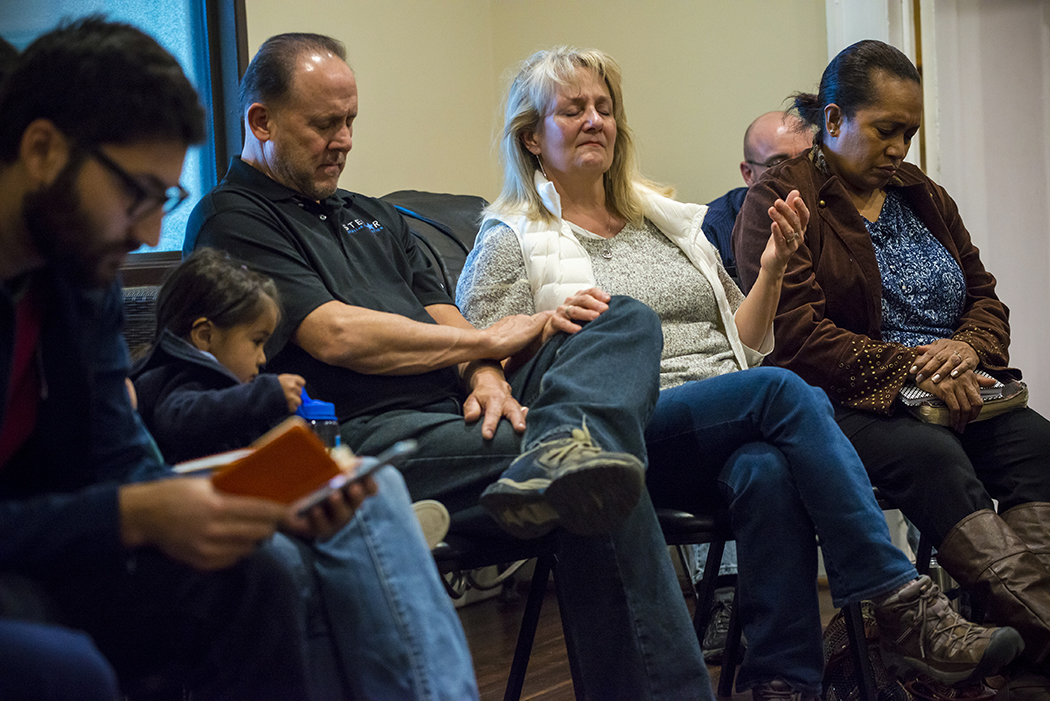
Believers gather for prayer at City Church International and serve the community with a food pantry. (Photo by Danny Fulgencio)
A LifeWay Research study reports that 67 percent of churchgoers say their church has not done enough to become racially diverse, but less than half the people in the same study think their church should become more diverse. Through outreach and an emphasis on meeting people where they are, City Church achieves what few churches have: A diverse congregation. The church offered bilingual translations and eventually helped start a Spanish-speaking congregation from its Hispanic community.
Academics with Ph.D.s sit next to the homeless and lawyers worship with former prostitutes at City Church. Weir once was made aware of a woman dealing with addiction who stole from another church member. “You are family,” he told her. “If you need something, you come to us.”
The church connects with inner city youth through activities and services such as a food pantry, even delivering pineapples to its neighbors. “People have to see that you really care,” Weir says.
Church leadership reflects diversity as well, with African-American, Tongan, Hispanic and Singaporean members providing a vision for the future. Weir sees his church as a beacon in a world of increased racial tension. “What is going on out there,” he says, “is not what we experience in here.”
Learn more at cci.church.
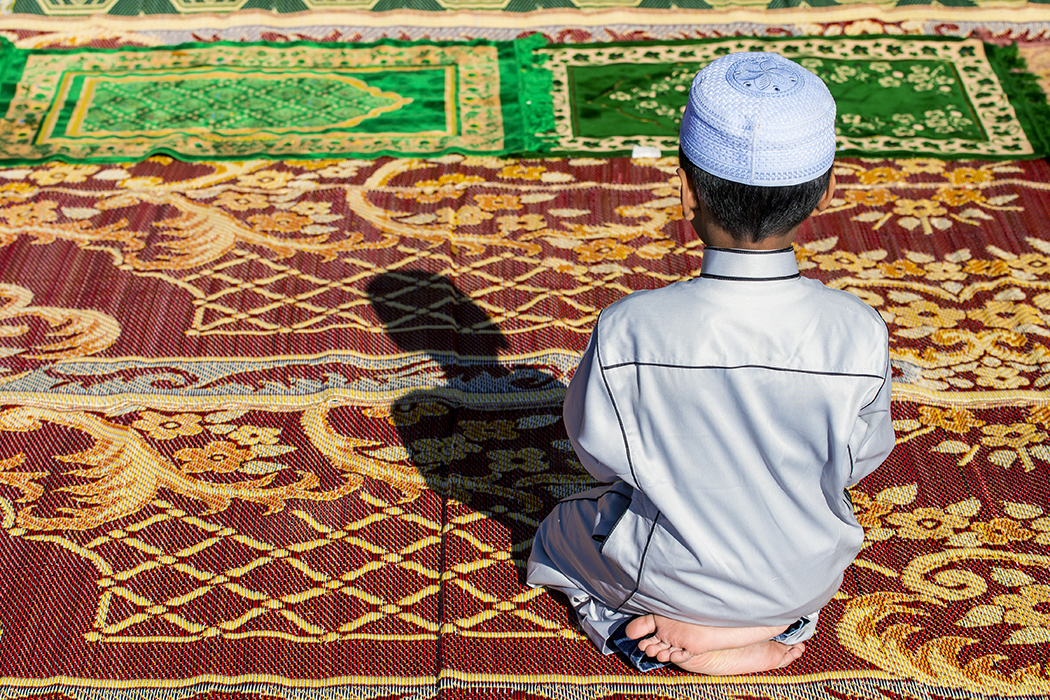
Photo by Danny Fulgencio
Rohingya Mosque
Vickery Meadow in Northeast Dallas is home to 50,000 people from all over the world in about five square miles, including many Muslim residents from the Middle East, Africa and Southeast Asia. But the area is not home to any public mosques. Because many residents lack transportation, traveling to the nearest mosque in Richardson is not a viable option. Rohingya Muslim Relief (RMR) stepped in to fill the void.
The organization emanated from Myanmar refugees, who fled their homeland’s violence against their faith. RMR created a space in The Ivy apartments so that Muslim neighbors can worship close to home. It also provides religious education for 180 Muslim children during the week. With permission from management, members transformed an old storage unit into a place to pray. Islamic art decorates the windowless room. Rugs line the floor and spill into the parking lot for worshippers to practice “Salah,” the five daily prayers. The space also has running water for residents to cleanse their face, hands and feet, a practice called “Wudu.”
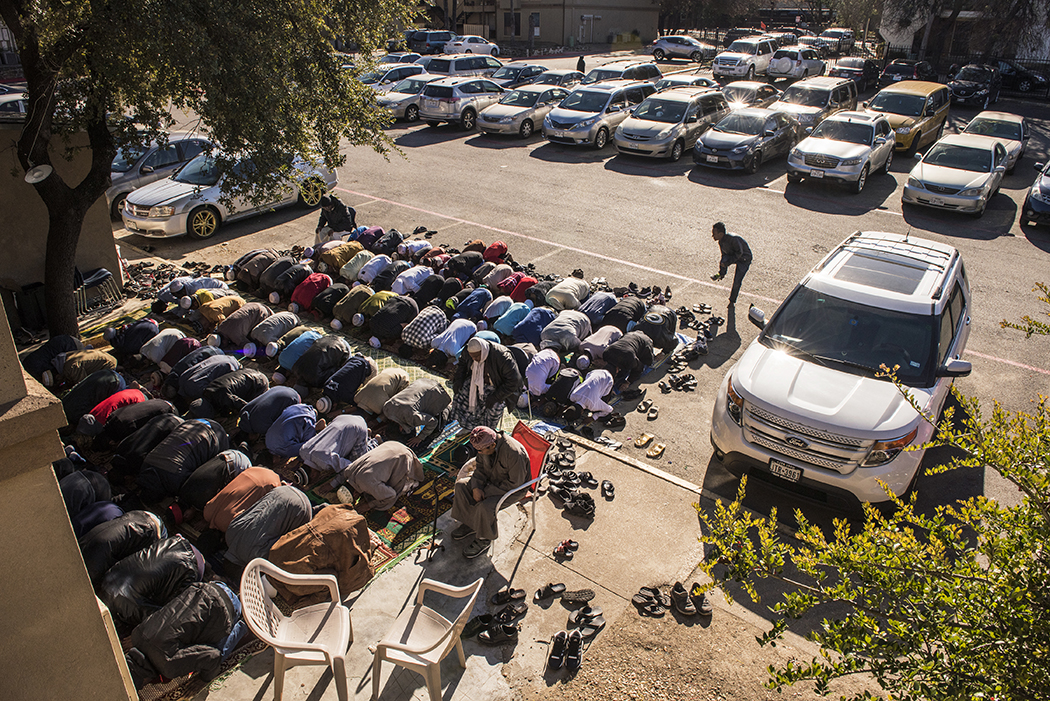
Believers young and old turn a storage room and parking lot in a Vickery Meadow apartment complex into a makeshift mosque for Friday afternoon prayers. (Photo by Danny Fulgencio)
In Myanmar, the Rohingya must worship in secret or risk a violent rebuke from the anti-Muslim government, according to Shaukat Salleh, RMR’s president. Refugees often risk their safety to escape their homeland and spend years in camps waiting to be resettled in a land with little resemblance to home. The RMR space provides them a chance to reconnect with their culture and faith.
RMR also serves more than 300 families by providing transportation, rent, furniture, clothes and food for those in need. The organization funds English as a second language and computer classes to help Vickery Meadow residents find jobs. The group’s services are not specific to religion or culture; members help anyone in need. “We don’t see religion,” says Salleh. “We see only people.”
Visit rmrus.org to learn more.
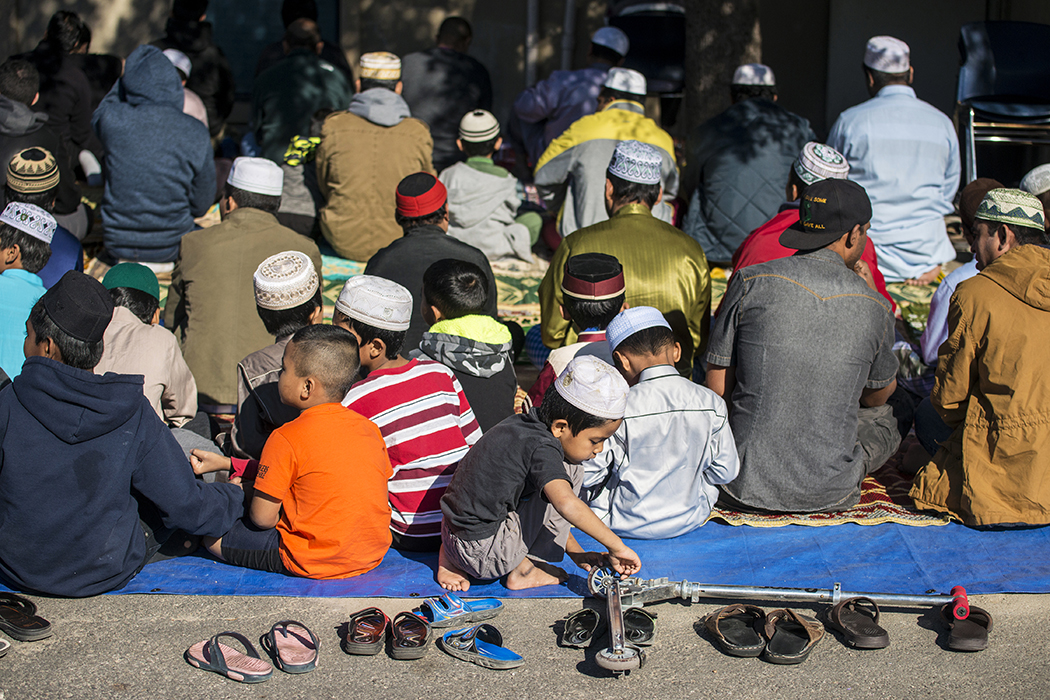
Photo by Danny Fulgencio


